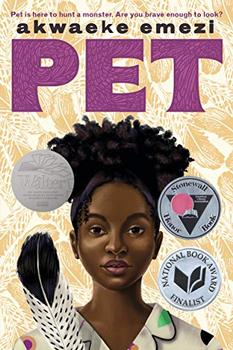Summary | Excerpt | Reviews | Beyond the Book | Readalikes | Genres & Themes | Author Bio

Critics' Opinion:
Readers' Opinion:
First Published:
Sep 2019, 208 pages
Paperback:
Jan 2021, 208 pages
 Book Reviewed by:
Book Reviewed by:
Catherine M Andronik
Buy This Book
Chapter 1
There shouldn't be any monsters left in Lucille.
The city used to have them, of course—what city didn't? They used to be everywhere, thick in the air and offices, in the streets and in people's own homes. They used to be the police and teachers and judges and even the mayor; yeah, the mayor used to be a monster. Lucille has a different mayor now. This mayor is an angel; the last couple of mayors have all been angels. Not like a from-heaven, not-quite-real type of angel but a from-behind-and-inside-and-in-front-of-the-revolution, therefore-very-real type of angel.
It was the angels who took apart the prisons and the police; who held councils prosecuting the former officers who'd shot children and murdered people, sentencing them to restitution and rehabilitation. Many people thought it wasn't enough; but the angels were only human, and it's hard to build a new world without making people angry. You try your best, you move with compassion, you think about the big structures. No revolution is perfect. In the meantime, the angels banned firearms, not just because of the school shootings but also because of the kids who shot themselves and their families at home; the civilians who thought they could shoot people who didn't look like them, just because they got mad or scared or whatever, and nothing would happen to them because the old law liked them better than the dead. The angels took the laws and changed them, tore down those horrible statues of rich men who'd owned people and fought to keep owning people. The angels believed and the people agreed that there was a good amount of proper and deserved shame in history and some things were just never going to be things to be proud of.
Instead, they put up other monuments. Some were statues of the dead, mostly the children whose hashtags had been turned into battle cries during the revolution. Others were giant sculptures with thousands of names carved into them, because too many people had died and if you made statues of everyone, Lucille would be filled with stone figures and there'd be no room for the alive ones. The names were of people who died when the hurricanes hit and the monsters wouldn't evacuate the prisons or send aid, people who died when the monsters sent drones and bombs to their countries (because, as the angels pointed out, you shouldn't use a nation as a basis to choose which deaths you mourn; nations aren't even real), people who died because the monsters took away their health care—names and names of people and people, countless letters recording that they had been.
The citizens of Lucille put dozens of white candles at the base of the monuments, hung layers of marigold necklaces around the necks of the statues, and when they walked past, they would often fall silent for a moment and press a palm against the stone, soaking up the heat the sun had left in it, remembering the souls the stone was holding. They'd remember the marches and vigils, the shaky footage that was splashed everywhere of their deaths (a thing that wasn't allowed anymore, that gruesome dissemination of someone's child gasping in their final moments, bubbling air or blood or grief—the angels respected the dead and their loved ones). The people of Lucille would remember the temples that were bombed, the mosques, the acid attacks, the synagogues. Remembering was important.
Jam was born after the monsters, born and raised in Lucille, but like everyone else she remembered. It was taught in school: how the monsters had maintained power for such a long time; how the angels had removed them, making Lucille what it is today. It wasn't like the angels wanted to be painted as heroes, but the teachers wanted the kids to want to be angels, you see? Angels could change the world, and Lucille was proof. Jam was fascinated by them, by the stories the teachers told in history class. They briefly mentioned other angels, those who weren't human, but only to say that Lucille's angels had been named after these other ones. When Jam asked for more information, her teachers' eyes slid away. They mentioned religious books, but with reluctance, not wanting to influence the children. Religion had caused so many problems before the revolution, people were hesitant to talk about it now. "If you really want to know," one of the teachers added, taking pity on Jam's frustrated curiosity, "there's always the library."
Excerpted from Pet by Akwaeke Emezi. Copyright © 2019 by Akwaeke Emezi. Excerpted by permission of Make Me a World. All rights reserved. No part of this excerpt may be reproduced or reprinted without permission in writing from the publisher.





The House on Biscayne Bay
by Chanel Cleeton
As death stalks a gothic mansion in Miami, the lives of two women intertwine as the past and present collide.

The Flower Sisters
by Michelle Collins Anderson
From the new Fannie Flagg of the Ozarks, a richly-woven story of family, forgiveness, and reinvention.

The Funeral Cryer by Wenyan Lu
Debut novelist Wenyan Lu brings us this witty yet profound story about one woman's midlife reawakening in contemporary rural China.
Your guide toexceptional books
BookBrowse seeks out and recommends the best in contemporary fiction and nonfiction—books that not only engage and entertain but also deepen our understanding of ourselves and the world around us.